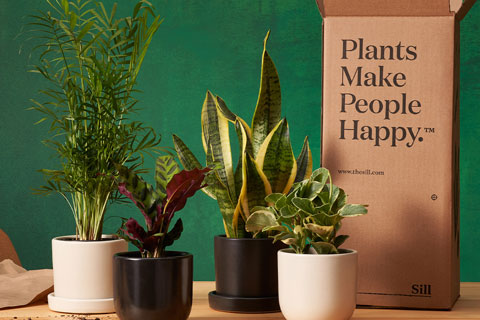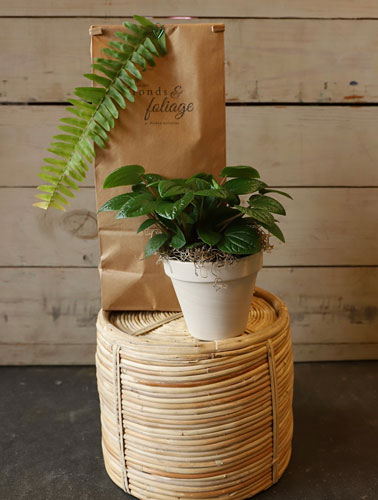4/1/2022
Delivering Repeat Business
Ann-Marie Vazzano

As garden retailers ramp up for spring, it’s hard to think about the off season. But, as summer sales die down, it can take some creativity to keep cash flowing.
For Emily Pilcher, head of design at Dothan Nurseries in Dothan, Alabama, the changes in customer behavior during the early days of the pandemic got her thinking. She noticed more customers wanted items delivered. At the same time, the popularity of subscription services seemed to be skyrocketing. By the summer of 2020, her idea to capitalize on these trends began to materialize: a houseplant subscription service.
By January 2021, the first plants as part of the Fronds & Foliage program were delivered to local subscribers, many of whom received the subscriptions as Christmas gifts.
“It worked out really well for us that first year and we’ve had a pretty steady amount of deliveries ever since,” Emily says.
A Sustainable Gift
Most of the subscriptions sold have been gifts, Emily says, which makes sense. A recent survey from coupon code website Wethrift found that nearly 40% of consumers would go out of their way to search for an environmentally friendly gift. Dothan Nurseries seems to have found a way to fill that niche.
Shoppers can choose from two subscription options: the Easy Peasy Plants subscription includes a new, easy-to-care-for houseplant each month, while the Paw-sitively Safe Plants option offers a pet-safe plant. Subscriptions are available in three-, six- or 12-month options. In addition to the 4-in. houseplant and pot, recipients get plant care instructions and free local delivery. As an added bonus, a web library with specific plant-care videos drives customers to the store’s website.
Currently, Dothan Nurseries delivers approximately 12 plants per month on average, and interestingly, Emily says many of the subscribers haven’t been regular nursery customers. Instead, they’ve discovered the subscription service via social media or the garden center’s website.
How Plants Are Chosen
Emily uses a spreadsheet to keep track of customer information, as well as the plants she chooses. Because the goal is for customers to be successful, she tries to stick with varieties that are fairly easy to care for while still providing interest.
“I try to avoid just your basic, average houseplant and pick things that are a little bit more exciting for people to get,” she says.
While each plant was initially sent with a terracotta pot, the store decided to increase subscription prices so they could offer more high-end, gift-y pots. In addition, each plant comes with a care card, handwritten thank-you note and a business card.
Emily says most customers are successful with their plants, but those who aren’t can simply bring the plant back and receive a replacement.
Growing Confident Customers
The Sill is another retailer that’s leveraged the growing popularity of houseplants and subscription services. The company started in 2012 by offering easy-to-care-for houseplants and decorative planters online for local delivery in the New York City area. Now, thesill.com ships plants nationwide in addition to operating several brick-and-mortar locations across the country.
While The Sill has been selling plants online since its inception, the idea for a monthly subscription didn’t come about until 2018, according to editorial lead Erin Marino.
 In 2014, when they opened their first physical store, The Sill began a Plant of the Month program, highlighting a specific plant each month while offering coinciding plant care workshops.
In 2014, when they opened their first physical store, The Sill began a Plant of the Month program, highlighting a specific plant each month while offering coinciding plant care workshops.
“Our subscriptions were a natural extension of this program that allowed our online customers and community members to participate,” Erin says.
The subscriptions were a huge hit.
“Over the years, we have had to pause monthly sign-ups for periods of time we were at capacity,” Erin says, adding that they’ve also had to cap the number of subscriptions they sell each month to ensure all orders can be fulfilled.
Like Dothan Nurseries, The Sill offers a pet-friendly option in addition to a classic plant subscription. Along with their plants, customers receive a ceramic planter, as well as access to resources available only to subscribers. All the subscription plants are exclusive, too, meaning they’re not yet available for purchase by other customers.
Erin says the subscription service has benefited the bottom line, partly because subscribers often have a higher repeat rate. But receiving easy-to-care-for plants with detailed care instructions can also boost confidence in people who weren’t sure where to start.
“Anecdotally, we have had subscribers share feedback that they were intimidated by houseplants, but then signed up for a subscription and are hooked,” Erin says. And, even if subscribers gain enough confidence to begin choosing plants on their own, The Sill has succeeded in getting another consumer hooked on houseplants.
“Most plant lovers would agree that once you have a couple plants, it’s inevitable you’ll love them and become a plant person,” she adds.
The Logistics
To help ensure success, The Sill collaborates with local growers to choose plants that make the most sense in terms of time of year and what’s available. Erin says it can still be a challenge sometimes to make sure plants arrive happy and healthy.
During winter, for example, plants are shipped with a heat pack and, if the weather is especially concerning, subscriptions are sometimes put on hold until conditions are better for shipping. Plants that don’t succeed within the first 30 days are replaced for free, as long as customers send photos that show the damage. Erin says this kind of feedback also helps The Sill discover any recurring problems, which, in turn, helps them improve the service.
Securing Sales Early
Romence Gardens in Grand Rapids, Michigan, has found another way to keep cash flowing during the off season, while also securing sales early. Visitors to Romence’s website have the option to pre-order plants early before the height of the spring planting season. These orders can be shipped nationwide.
Co-owner Katie Romence says that being a retail-grower, the business was often growing more product than it could sell—which isn’t a bad thing.
“You always want to have more than what you need because you want to make sure people see full tables,” she notes.
But they also didn’t want to waste perfectly good product. That’s how the idea to sell plants online came about, and it turned out to be a perfect solution for growing the business without adding another brick-and-mortar location.
Customers can order plants during the winter months, with ship dates beginning in April, depending on their location and the plant maturity level. Annuals are the biggest sellers online, but herbs, veggies, perennials and even houseplants are available for shipping, too.
In order to make sure orders are fulfilled in a timely manner, Romence Gardens hires seasonal workers to help with packaging and shipping.
Although they began dabbling in e-commerce about 10 years ago, Katie says they’ve really started to focus on the online business more over the last few years. In addition to securing early sales, it’s been helpful in expanding and improving the business’s website. The site now acts as a reference tool for gardeners looking for growing tips, as well as information on plant hardiness, bloom time, height, spread and other characteristics that are all available to view when a shopper clicks on a specific plant.
Gardeners from across the country also now look to Romence Gardens to make sure they get the plants they want, when they want them, which is especially helpful in an era of supply chain issues and product shortages. Katie says approximately 95% of their online customers are from outside the area, with locals making up about 5% of website orders.
In addition to increased cash flow during typically slower months, Katie says the pre-orders also give her an early eye on the trends.
“We’re all living in a world where we have to keep changing and morphing how we’re going to do things,” Katie says. “So what this has done is really put us into other markets where I can hear what people are looking for outside of where we are.” GP
Ann-Marie Vazzano is a freelance writer and editor based in Northeast Ohio. She can be reached at amvazzano@gmail.com.